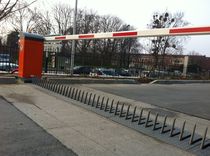It always makes me nervous when I go through a toll booth with road spikes.
Even though an untold number of cars have safely passed through them, I always wonder if they have been installed correctly.
I figure I’ll be the first person to legally pass through the gate only to have my tires explode because an installer turned the drawings upside down.

Gates have spikes to ensure that traffic only flows one way. You can’t go in the exit and once you are out, you are out. There is no turning back.
Far too often, we look at decisions like gates with spikes.
We feel the pressure of making the right decision and approach it as though once we make the decision there is no turning back.
This is true with some decisions:
- getting married
- donating a kidney
- demolishing a building
With some decisions there is no turning back, but that isn’t true with most decisions.
Most of the choices which we have to make, can be unmade.
We can change our minds.
We can try something, see how it works, and try something else.
It’s true of careers.
For a majority of people, if you don’t like your current job, you can go back to school, get new training, and find something else. Sure it will take a lot of work, effort, and money, but the opportunity is there.
The vast majority of decisions which cause us to fret, are decisions which can be undone if we get them wrong.
This fact should free us.
It shouldn’t cut down our work or ease the decision making process, but it should give us greater confidence in making a decision.
With most choices—even big ones—we are not jumping out of an airplane. If we walk through the door and wish we wouldn’t have, we can turn around and walk right back through it.
“Most doors swing both ways,” a mentor tells me. It’s true and it’s liberating.
Take your time.
Choose wisely.
Understand that mistakes can be costly.
But don’t worry so much about the outcome that you are paralyzed from ever making a decision.
Even if you get it wrong, you can make it right.
Even if you can’t make it right, you can un-make most decisions and try again.
The good news with trying again is that you are a little bit wiser the second time than the first.



